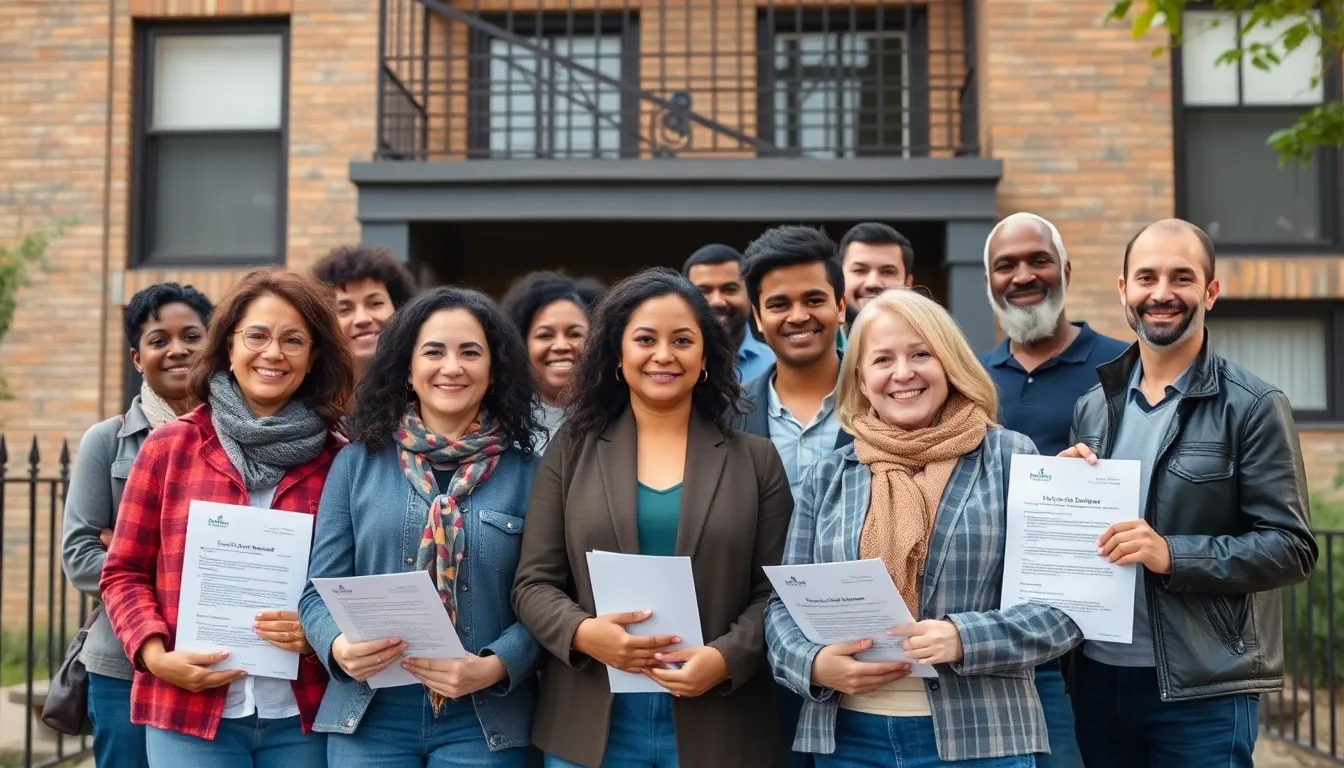Navigating the world of renting can be overwhelming, especially for those unfamiliar with their legal rights. Whether it’s dealing with a landlord, understanding lease agreements, or addressing maintenance issues, knowing what protections exist can make all the difference. Renters have rights that safeguard them from unfair treatment and ensure a safe living environment.
From the right to a habitable home to protections against discrimination, these legal rights empower tenants to advocate for themselves. Understanding these rights not only helps renters make informed decisions but also fosters a more harmonious relationship with landlords. This article dives into the essential legal rights every renter should know, providing clarity and confidence in the rental process.
Table of Contents
ToggleUnderstanding Renters Legal Rights
Renters possess several legal rights designed to protect them during the rental process. These rights vary by state but commonly include:
- Right to a Habitable Home: Renters must receive living conditions that meet basic safety and health standards. Landlords must address significant issues such as plumbing, heating, and pest infestations.
- Right to Privacy: Tenants can expect privacy in their living spaces. Landlords usually require notice before entering, often mandated to provide a specific time frame, typically 24 hours.
- Right to Fair Housing: Laws prohibit discrimination based on race, color, national origin, religion, sex, familial status, or disability. Renters can report discriminatory practices to federal or state authorities.
- Right to Security Deposit Protection: Landlords must outline the terms regarding security deposits clearly. In many instances, they must return deposits within a specified timeframe after lease termination, detailing any deductions made.
- Right to a Written Lease Agreement: Renters are entitled to a written agreement outlining the terms of tenancy, including rent amount, payment schedule, and maintenance responsibilities. This document serves as a legal reference.
- Right to Organize: Tenants can form groups to discuss issues related to their rental properties or advocate for collective rights without facing retaliation from their landlord.
It’s crucial for renters to recognize these rights and assert them. Awareness can help mitigate disputes and foster a constructive tenant-landlord relationship.
Common Legal Rights for Renters

Renters have several important legal rights that protect them throughout the rental process. Understanding these rights enables tenants to maintain safe and fair living conditions.
Right to habitable housing
Renters possess the right to live in a habitable home. This means that landlords must provide a residence that meets health and safety standards. Essential amenities, such as heating, running water, and secure entryways, fall under this requirement. If a landlord fails to address significant issues, tenants may have grounds to seek repairs or even terminate the lease.
Right to privacy
Renters hold the right to privacy within their rented premises. Landlords cannot enter the property without proper notice, generally 24 to 48 hours in advance, unless there is an emergency. This legal protection allows tenants to enjoy their homes without unwarranted interruptions and helps foster a respectful landlord-tenant relationship.
Right to security deposit protection
Renters also have the right to protection regarding security deposits. Landlords must clearly outline the conditions for the return, use, and potential deductions from these deposits. Some states mandate that deposits be kept in interest-bearing accounts. If a landlord unjustifiably withholds a security deposit, tenants can dispute the charges and may pursue legal action to recover the funds.
State-Specific Laws and Regulations
State-specific laws and regulations significantly impact renters’ rights. These rules differ based on local legislation, making it crucial for tenants to understand their entitlements in their respective states.
Key differences by state
- Habitability Standards: States vary in defining what constitutes a habitable dwelling. Some states impose strict requirements regarding plumbing, heating, and safety, while others have more lenient standards.
- Security Deposits: Each state sets limits on the amount landlords can collect for security deposits. Some states cap deposits at one month’s rent, whereas others may allow higher amounts with specific conditions governing returns.
- Eviction Processes: Notice periods and reasons for eviction significantly differ by state. While some states require 30 days’ notice for no-cause evictions, others may mandate just cause or longer notice periods.
- Rent Control: Certain areas impose rent control measures to limit rent increases, while others allow landlords greater freedom to raise rents. Not all states have such regulations.
- Tenant Privacy Rights: Laws governing landlord access to rental units also differ. States may require notice before entry, specifying the notice period and permissible reasons for access.
- Discrimination Protections: Certain states provide broader protections against discrimination beyond federal laws. Local laws may include additional protected classes, such as sexual orientation or gender identity.
Resources for state laws
- State Housing Agencies: Most states offer websites with comprehensive information on tenant rights, legal aid, and housing regulations.
- Legal Aid Organizations: These organizations provide free legal advice and resources specific to state laws, helping tenants understand their rights and responsibilities.
- National Tenant Organizations: Groups like the National Low Income Housing Coalition advocate for renters and provide resources tailored to individual state laws.
- Local Government Websites: Municipal websites often publish tenant rights and landlord obligations. These sites serve as valuable resources for understanding local ordinances.
- Online Legal Databases: Websites such as Nolo and FindLaw host state-specific legal information and articles about renters’ rights, making them accessible for tenants seeking guidance.
Understanding these variations helps renters navigate their rights effectively and engage with landlords from an informed perspective.
How to Assert Your Legal Rights
Understanding how to assert legal rights as a renter is crucial for maintaining a secure and fair living environment. Taking appropriate steps can help address disputes effectively.
Steps to take
- Review the lease agreement
Review all terms outlined in the lease document. Ensure understanding of all responsibilities and rights specified within the agreement.
- Document issues
Document maintenance problems, breaches of lease terms, or incidences of harassment. Keep records of communications with landlords, including dates and content.
- Notify the landlord
Provide written notice to the landlord regarding issues. Ensure clear communication and set a reasonable timeline for a response or resolution.
- Know local laws
Familiarize oneself with state and local housing laws. Identify relevant statutes that protect renters and may apply to specific situations.
- Seek mediation
Consider mediation as an option to resolve disputes amicably. Utilize local tenant organizations or legal aid services to explore available mediation programs.
- File complaints
If issues remain unresolved, file a complaint with local housing authorities. This initiates a formal process that can help address violations.
When to seek legal assistance
- Significant disputes arise
Seek legal assistance if facing substantial disputes with the landlord that cannot be resolved through communication or mediation.
- Eviction notices received
Consult a legal professional immediately upon receiving an eviction notice. Understanding rights in such situations is vital for protection against unlawful eviction.
- Discrimination encountered
Contact legal resources if experiencing discrimination based on race, gender, or other protected categories. State and federal laws safeguard tenants against discrimination.
- Uninhabitable living conditions
Seek legal help if the landlord fails to address serious issues related to habitability, such as mold, pest infestations, or lack of essential services.
- Improper handling of security deposits
Consult an attorney if the landlord withholds a security deposit unjustly. Understanding the legal guidelines regarding security deposit return can aid in recovery.
By following these steps and recognizing when to seek legal assistance, renters can effectively assert their rights and secure a fair rental experience.
Understanding renters’ legal rights is crucial for anyone navigating the rental landscape. With this knowledge, tenants can confidently advocate for themselves and ensure their living conditions meet legal standards. By familiarizing themselves with specific rights and local regulations, renters can effectively address issues with landlords and maintain a respectful relationship.
Utilizing available resources and knowing when to seek legal assistance empowers tenants to tackle disputes and protect their interests. Awareness of these rights not only fosters a healthier rental experience but also contributes to a more equitable housing environment for all.




